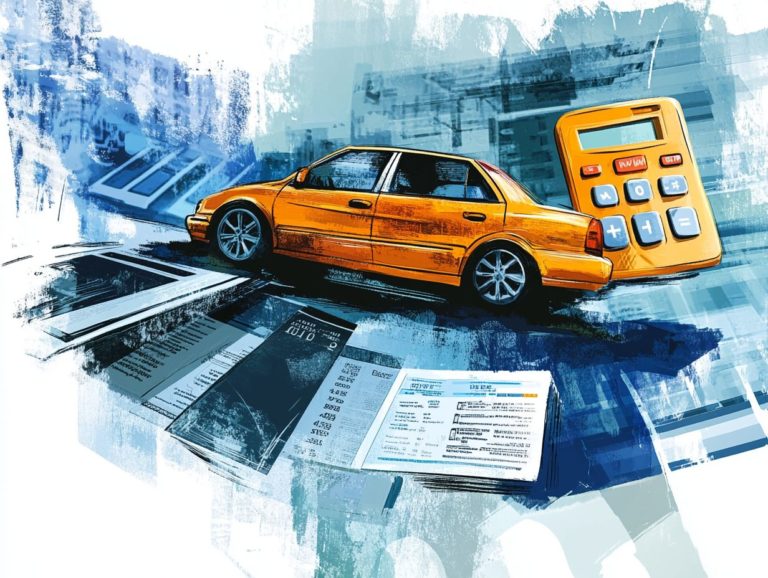5 Facts About Auto Insurance in Massachusetts
Navigating auto insurance in Massachusetts might seem overwhelming at first, but grasping the essentials can certainly ease the process.
With the state s unique no-fault insurance system and specific coverage requirements dictated by law, there s a considerable amount to take into account. Let’s explore five essential facts that every driver in Massachusetts should know! This guide outlines strategies for saving money, potential penalties for being uninsured, and tips for selecting the right coverage.
Whether you re a seasoned driver or just starting out in the state, this information will empower you to make informed decisions about your auto insurance, ensuring you re well-prepared for the road ahead.
Contents
- Key Takeaways:
- 1. Auto Insurance Is Required by Law in Massachusetts
- 2. Minimum Coverage Requirements
- 3. Unique No-Fault Insurance System
- 4. Factors That Affect Auto Insurance Rates in Massachusetts
- 5. Discounts Available for Massachusetts Drivers
- What to Do in Case of an Accident in Massachusetts?
- How Does Massachusetts Compare to Other States in Terms of Auto Insurance Laws?
- What Are the Most Common Types of Auto Insurance Coverage in Massachusetts?
- How Can Drivers Save Money on Auto Insurance in Massachusetts?
- What Are the Most Important Things to Know When Shopping for Auto Insurance in Massachusetts?
- Frequently Asked Questions
- What is auto insurance and why is it important in Massachusetts?
- What are the minimum requirements for auto insurance in Massachusetts?
- What other types of coverage should I consider?
- Can I save money on auto insurance?
- How does the no-fault system work in Massachusetts?
- What are the consequences of driving without insurance?
Key Takeaways:
- Auto insurance is mandatory in Massachusetts, and drivers must meet minimum coverage requirements.
- Massachusetts has a unique no-fault insurance system, which means your insurance will cover your medical expenses regardless of fault.
- Factors such as age, driving history, and location can affect your auto insurance rates in Massachusetts.
1. Auto Insurance Is Required by Law in Massachusetts
Auto insurance is not merely a financial necessity; it s a legal requirement for every driver in Massachusetts. This coverage ensures you are protected against various risks associated with driving, such as bodily injury, property damage, and personal injury protection (PIP). By having this mandatory insurance, you secure financial security for yourself and your passengers in the event of an accident, contributing to safer roads throughout the state.
In Massachusetts, you re required to maintain specific types of coverage, including personal injury protection (PIP), which covers your medical expenses and lost wages regardless of fault in an accident. You also need uninsured motorist coverage to protect yourself when involved in an accident with drivers who lack sufficient insurance. While Massachusetts boasts a lower-than-average accident rate, staying compliant with these coverage requirements is crucial; neglecting to do so could result in substantial fines or even license suspension.
Ultimately, by adhering to these laws, you not only protect yourself financially but also play a vital role in enhancing the safety of your community.
2. Minimum Coverage Requirements
In Massachusetts, you must adhere to specific minimum coverage requirements for automobile insurance to ensure you re adequately protected against potential liabilities, including bodily injury and property damage.
These essential coverages include a minimum of $20,000 per person and $40,000 per accident for bodily injury, designed to address the medical expenses of injured parties. You’ll also need at least $5,000 in property damage coverage to take care of damages to another person’s property if an accident occurs.
Don t overlook personal injury protection (PIP), which requires a minimum of $8,000. This is vital for covering medical bills and lost wages for you and your passengers, no matter who s at fault. These coverages are not just a legal obligation; they provide you with peace of mind and financial security while navigating the roads.
3. Unique No-Fault Insurance System
Massachusetts operates under a distinctive no-fault insurance system that allows you to receive compensation for injuries without the burden of proving fault in an accident. This streamlined approach prioritizes swift medical payments, making your claims process much more efficient.
Essentially, you can file a claim with your own insurance provider, ensuring that your medical expenses and certain other costs are covered promptly, regardless of who is deemed liable. Unlike traditional fault-based systems that are common in many states often leading to protracted legal battles and disputes over responsibility the no-fault model promotes a more efficient resolution for personal injury protection.
This system not only eases the stress of navigating complex fault determinations but also encourages you to seek medical treatment without the delays that litigation can cause. For many drivers in Massachusetts, this insurance structure provides a sense of security and facilitates a quicker recovery process.
Don’t wait ensure you’re covered today to avoid hefty fines!
4. Factors That Affect Auto Insurance Rates in Massachusetts
Several factors influence your auto insurance rates in Massachusetts. These include how risky you are as a driver, driving record, and the type of coverage you choose. This results in varying premiums from different insurance companies.
The make and model of your vehicle are crucial. Certain cars may be classified as higher risk due to their repair costs or safety ratings. Your location also plays a significant role. If you live in an urban area, expect higher premiums because of increased traffic and the likelihood of accidents.
Your past claims history is another important factor. A documented history of claims can signal higher risk to insurers, leading them to charge you more.
This is where insurance agents come in handy. They can guide you through these factors and help you secure competitive quotes tailored to your individual circumstances.
5. Discounts Available for Massachusetts Drivers
As a driver in Massachusetts, take full advantage of various discounts offered by insurance companies. These discounts can significantly lower your insurance premiums based on factors such as your driving record and safe driving practices.
If you maintain a clean driving record, you may qualify for a discount for safe driving, potentially saving you hundreds of dollars each year.
Bundling your auto insurance with your home or renter insurance can often lead to a multi-policy discount, further lightening your financial load. Some insurers also offer accident forgiveness programs, which mean your first mishap won t instantly send your premium skyrocketing.
These options work together to enhance affordability. They make it easier for you to manage your auto insurance costs while ensuring you have the coverage you need.
What to Do in Case of an Accident in Massachusetts?
In the unfortunate event of an accident in Massachusetts, it s crucial to know the necessary steps to ensure your safety and protect your legal rights. Each action you take matters, from notifying authorities to filing insurance claims for personal injury protection and property damage.
-
Start by confirming that everyone is safe. Calling the police should be your immediate priority. This official documentation will be crucial later on.
-
Next, exchange contact and insurance information with the other party. This will smooth the claims process down the road.
-
Document the scene. Snap some photos and take note of any witness statements, as these can significantly strengthen your case.
-
Reaching out to your insurance agent promptly is also key. This ensures that you file the necessary claims without delay.
Lastly, maintaining a clean driving record is vital. It can significantly impact your future claims and premiums. Consistently adhering to safe driving practices benefits you in the long run and helps create a safer environment for everyone on the road.
What Are the Penalties for Driving Without Insurance in Massachusetts?
Driving without insurance in Massachusetts can lead to serious consequences that you definitely want to avoid. These include hefty fines, license suspension, and potential legal liability if you find yourself in an accident.
If you re caught operating a vehicle without the proper coverage, you could face fines from $500 to $5,000, depending on your situation. Your driver s license could also be suspended for up to a year. This disruption can cause significant hassle and complications, like skyrocketing insurance rates down the line.
The fallout doesn t stop with immediate financial penalties. Failing to comply with state insurance laws can also put your ability to obtain a valid driver s license at risk during future renewals. Understanding this legal landscape is essential for any driver who wants to steer clear of serious repercussions.
How Does Massachusetts Compare to Other States in Terms of Auto Insurance Laws?
Massachusetts truly stands out with its no-fault insurance system. This unique approach significantly changes how drivers navigate their insurance requirements.
If you find yourself in an accident, you can claim compensation from your own insurance company, regardless of who is at fault. This streamlines the process for addressing injuries and damages, making it more efficient for everyone involved.
Unlike many states that focus solely on liability coverage, Massachusetts requires both personal injury protection (PIP) and bodily injury liability. This adds an extra layer of security for you as a driver.
The penalties for not adhering to these regulations can be quite severe, including substantial fines and even license suspensions. These measures deter uninsured driving. Such distinctive features highlight the state s dedication to protecting both drivers and passengers, clearly setting it apart from jurisdictions with more relaxed insurance requirements.
What Are the Most Common Types of Auto Insurance Coverage in Massachusetts?
In Massachusetts, you have access to a diverse array of auto insurance options, including liability insurance, collision coverage, comprehensive coverage, and personal injury protection.
Liability insurance is a must-have. It covers damages you may cause to others in an accident, protecting you from potential lawsuits. Collision coverage takes care of repair costs for your vehicle after a crash, no matter who s at fault.
Comprehensive coverage protects you from non-collision-related incidents like theft or natural disasters. Personal injury protection, or PIP, addresses medical expenses and lost wages after an accident, regardless of fault.
To determine the best mix of coverage, evaluate your individual needs consider your vehicle’s value, driving habits, and financial situation. Don t forget to account for state requirements and premium costs as you make your choice.
How Can Drivers Save Money on Auto Insurance in Massachusetts?
There are various strategies to save money on auto insurance in Massachusetts. Start by taking advantage of available discounts, maintaining a clean driving record, and shopping around for the best premiums.
By actively researching different insurance providers, you can uncover a range of rates and coverage options tailored to your specific needs. Ask about discounts for safe driving habits, bundled policies, and even membership affiliations that can reduce your premiums.
Regularly checking your driving record helps identify areas for improvement, such as completing defensive driving courses. This will enhance your skills and may lead to additional savings. Adopting these practices will enable you to take effective control of your insurance costs.
What Are the Most Important Things to Know When Shopping for Auto Insurance in Massachusetts?
When shopping for auto insurance in Massachusetts, grasp the various coverage options, premiums, and available discounts. This knowledge helps you make informed choices tailored to your needs and budget.
Evaluate the specific risks tied to your driving habits and the type of vehicle you own. This will help you determine the level of coverage that suits you. Research how premiums are calculated; factors like your driving history and credit score can significantly influence costs.
Understanding deductibles the amount you pay out of pocket before insurance starts can also impact your overall expenditure. Consulting with experienced insurance agents can provide invaluable insights into policy intricacies, helping you navigate options, compare rates, and uncover potential savings.
Frequently Asked Questions
What is auto insurance and why is it important in Massachusetts?
Auto insurance is a form of financial protection for drivers and their vehicles. In Massachusetts, it is required by law to have a minimum amount of auto insurance to legally operate a vehicle on the road.
Start comparing quotes today to find the best deal on your auto insurance!
What are the minimum requirements for auto insurance in Massachusetts?
In Massachusetts, you need at least $20,000 for bodily injury to others. You’ll also need $40,000 for bodily injury per accident, $8,000 for personal injury protection, and $5,000 for property damage.
What other types of coverage should I consider?
Consider optional coverages like collision and comprehensive insurance. These cover damages to your vehicle from accidents, theft, or natural disasters.
Can I save money on auto insurance?
Yes, many insurance companies offer discounts. Look for savings like good student discounts, multi-car discounts, and safe driver discounts.
How does the no-fault system work in Massachusetts?
Massachusetts uses a no-fault system. This means that each driver s insurance covers their own damages and injuries, no matter who caused the accident.
What are the consequences of driving without insurance?
Driving without auto insurance is a serious offense in Massachusetts. You could face fines, lose your license, or even go to jail. Plus, you will have to pay for any damages and injuries from an accident out of your own pocket.



